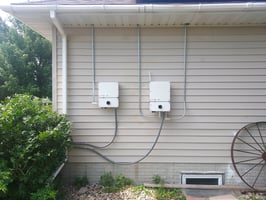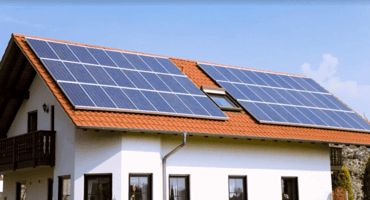Nothing lasts forever, but the sun? That’s something we can count on. If you’re a homeowner looking to reduce your energy bills and power your life with clean solar energy, you may wonder what type of roof is best for mounting solar panels.
While it certainly isn’t the only factor in determining whether or not rooftop solar installation makes sense for you, the quality and type of your roof will influence how much solar energy potential is available to you.
Here at Wolf River Electric, we believe that an informed decision leads to happy customers — which is why we’ve created this comprehensive post to select the best roof for your home’s new solar system.
Why You Need The Right Roof To Install Solar Panels

Maximum Sun Exposure
Solar panels require adequate sunlight exposure to generate electricity efficiently. The right roof should have a suitable orientation and tilt angle to capture maximum sunlight throughout the day.
Roofs with south-facing orientations and minimal shading obstructions are ideal for achieving optimal energy production.
Structural Integrity
Solar panels add additional weight and load to the roof. It is vital to have a structurally sound roof capable of supporting the weight of the panels and withstand various weather conditions.
A sturdy roof ensures the safety of both the solar panel system and the overall structural integrity of the property.
Long-Term Compatibility
Solar panel systems typically have a lifespan of 25 years or more. The right roof should have a similar or longer remaining lifespan to avoid the need for roof replacement during the life of the solar panels.
Installing solar panels on an aged or deteriorating roof may require removing and reinstalling the panels, resulting in additional costs and inconvenience.
Cost-Effectiveness
The right roof design and condition can impact the overall cost-effectiveness of your residential solar power system. A roof that requires replacement or extensive repairs before installation can add significant expenses to the project.
On the other hand, a well-maintained roof with a suitable design can facilitate a smoother and more cost-efficient installation process.
Best Roofing Materials For Solar Panels

Asphalt Shingles
Asphalt shingles are one of the most common and cost-effective roofing materials for solar panels. They are widely available, easy to install, and compatible with various solar mounting systems.
Asphalt shingles provide a stable and durable surface for panel installation, and their dark color helps with heat absorption, which can enhance energy production.
Metal Roofs
Metal roofs, such as standing seam or corrugated metal, are highly suitable for solar panel installations. They offer durability, longevity, and excellent resistance to weather conditions.
Metal roofs provide a secure and stable foundation for solar panels, and their smooth surface allows for easy installation and optimal sun exposure. Additionally, metal roofs have excellent heat dissipation properties, which can help improve solar panel efficiency.
Tile Roofing
Tile roofs, including clay or concrete tiles, can also be a good choice for solar panel installations. Tile roofs are durable, long-lasting, and provide a visually appealing aesthetic.
Solar panels can be mounted directly on tile roofs using appropriate brackets or flashing. However, it is important to work with experienced installers who are familiar with the specific requirements of installing solar panels on tile roofs.
Tar And Gravel Roofs
Tar and gravel roofs are generally not the best option for solar panel installations. These roofs are often flat or low-slope, making it challenging to achieve optimal sun exposure and proper water drainage.
Mounting solar panels on tar and gravel roofs may require specialized equipment and expertise. It is advisable to consult with a professional solar installer to assess the feasibility and determine suitable installation methods for this type of roofing material.
Wood
While it is possible to install solar panels on wood roofs, they are generally considered a poor choice due to various factors.
Wood shingles or shakes have a shorter lifespan compared to other roofing materials and may require replacement or repairs during the life of the solar panels. Plus, wood roofs can be more challenging to work with and may require extra precautions to ensure a secure and successful installation.
Go Solar Today!
Roof Aspects That Affect Its Compatibility With Solar Panels

Material For Solar Panels
Asphalt shingles, metal roofs, and tile roofs are generally suitable, while roof materials like wood shakes may require additional precautions. The roof material should provide a stable and durable surface for panel installation and allow for secure mounting.
Pitch
Roofs with a south-facing orientation and a pitch angle between 15 to 40 degrees are optimal for solar installations.
The angle helps maximize sunlight exposure and energy production. However, solar panels can be installed on roofs with different pitches, utilizing adjustable mounting systems to achieve optimal tilt.
Shape And Size
Rectangular or square-shaped roofs with ample surface area provide more roof space for panel installation. Complex roof shapes like hips or valleys may require careful planning and design adjustments to optimize solar panel placement and maximize energy production.
Orientation
Roofs with a south-facing orientation receive the most sunlight throughout the day, resulting in optimal energy production. East or west-facing roofs can still be suitable for solar panel installations, but their energy output may be slightly reduced.
Amount Of Shade
Shading from nearby trees, buildings, or other obstructions can significantly affect solar panel performance.
Assess and minimize shading to ensure maximum sunlight exposure and energy production. Tree trimming or adjustments in panel placement may be necessary to mitigate shading effects.
How Solar Panels Attach To Different Roof Types
Asphalt Shingle Roof
Solar panels can be attached to an asphalt shingle roof using a racking system. Mounting brackets are secured directly onto the roof, and the panels are then attached to the brackets. This method ensures stability and protects the roof from damage caused by weather elements or shifting.
Tile Roof
For tile roofs, solar panels can be attached using tile hooks or brackets. These hooks or brackets are slipped under the tiles, and the panels are mounted onto them. This approach allows for secure attachment without compromising the integrity of the tiles or the roof’s structure.
Standing Seam Metal Roof
Solar panels can be mounted on a standing seam metal roof using specialized clamps. These clamps are designed to grip the raised seams of the metal roof, providing a secure connection for the panels. The clamps are adjustable, allowing for flexibility in panel placement and ensuring a tight fit.
Tar Roof
Solar panels can be attached to a tar roof using a ballasted or penetrating mount system. In the ballasted system, weighted blocks are used to secure the panels, minimizing the need for roof penetrations.
Alternatively, penetrating solar panel mounts involve fastening the panels directly to the roof using appropriate sealing techniques to maintain the roof’s integrity.
Wood Roof
Installing solar panels on a wood roof typically requires flashing and roof hooks. Flashing is placed under the roofing material, creating a watertight seal and protecting against potential leaks.
Roof hooks are then attached to the wood structure, allowing for the secure mounting of the panels.
Roof Strength Requirements For Solar Panel System
When installing a solar panel system, it is crucial to consider the roof’s strength requirements. The additional weight of the solar panels, mounting racks, and other equipment significantly load the roof structure.
A structurally sound roof is necessary to support this added weight over an extended period. Conducting a thorough structural assessment, following local building codes and standards, ensuring proper load distribution, and considering reinforcement measures if needed are key aspects in determining the roof’s strength requirements.
As a homeowner, you are guaranteed a safe and reliable installation that will effectively support the solar panel system for its intended lifespan.
Contact Wolf River Electric For Help

Ultimately, your roof is among the foundation for success when installing solar panels. It gives you the necessary support to maximize solar energy and ensure your installation runs at its highest potential.
Most important is to consider aspects of a roof when making decisions about a solar panel project – the amount of shade, age of the roof, material used, and more.
Do not forget that safety should always be your top priority, and if you have any doubts or questions, contact us at Wolf River Electric to help you with the entire process from start to finish.
Frequently Asked Questions
Does Installing Solar Panels Affect My Roof Warranty?
No, installing solar panels does not typically affect your roof warranty. Reputable solar installers take measures to minimize any potential damage during installation, and they often work with the existing roof warranty to ensure coverage and compliance. However, you need to review your roof warranty documents and consult with your roofing manufacturer or contractor to understand any specific terms or limitations that may apply fully.
Do You Need To Replace Your Roof To Go Solar?
No, you do not necessarily need to replace your roof to go solar. If your roof is in good condition with a reasonable remaining lifespan, it can typically support solar panel installation without the need for replacement. If your roof is aged, damaged, or nearing the end of its life, it is advisable to consider replacing it before installing solar panels to ensure a secure and long-lasting system.
How Much Does A Roof Replacement Cost?
The cost of a roof replacement depends on several factors, including the size and complexity of your roof, the chosen roofing materials, the region you are located in, and any additional services required. Roof replacement costs vary widely, but as a rough estimate, you can expect costs to range from $5,000 to $20,000 or more. Obtain multiple quotes from reputable roofing contractors for an accurate estimate based on your specific needs and location.
What Is The Best Roof Design For Solar Installation?
The best roof design for solar installation is not limited to a specific type, but asphalt shingle roofs are commonly considered a good option for solar panel installations. They are widely available, relatively affordable and compatible with various solar mounting systems. However, other roof types like metal roofs or tile roofs can also be suitable depending on factors such as the roof’s orientation, angle, and shading considerations.
What Type Of Roof Is Not Good For Solar Panels?
Wooden roofs are generally not recommended for solar panel installations. Wood shingles or shakes can be more challenging and require additional precautions to ensure a secure installation. Wood roofs may have a shorter lifespan than other roofing materials, which can affect the long-term viability of the solar panel system.
Join Our Solar Community
Get exclusive access to the latest solar news, tips, and promotions!

